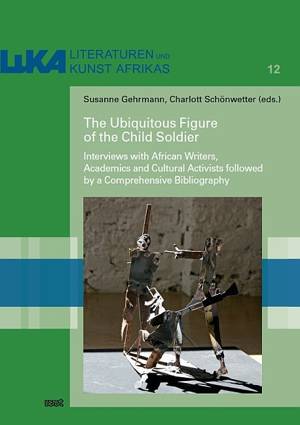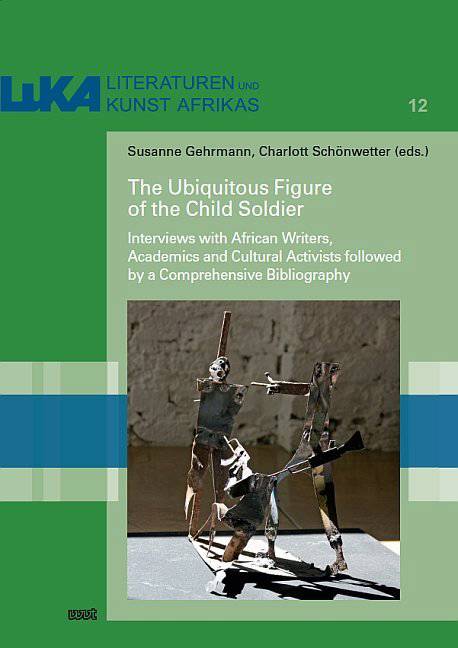
- Retrait gratuit dans votre magasin Club
- 7.000.000 titres dans notre catalogue
- Payer en toute sécurité
- Toujours un magasin près de chez vous
- Retrait gratuit dans votre magasin Club
- 7.000.0000 titres dans notre catalogue
- Payer en toute sécurité
- Toujours un magasin près de chez vous
The Ubiquitous Figure of the Child Soldier
Interviews with African Writers, Academics and Cultural Activists followed by a Comprehensive Bibliography
29,95 €
+ 59 points
Description
Over the last twenty years, African child soldiers have been a seminal topic in the media and in literature. In narrative genres such as testimony, fiction and film, the persona of the war child has become a trope, a figure of meaning with varying connotations. African and Afrodiasporic authors and filmmakers with roots in different regions of the continent use different narrative, rhetorical and visual aesthetic strategies to represent child soldiers and contribute to an alternative discourse on this ubiquitous figure that goes beyond Western mainstream media.
The interviews presented in this collection feature the opinions of academic teachers, scholars, writers, filmmakers, journalists and readers based in Nigeria, the Democratic Republic of the Congo and different diasporic locations who have worked on the topic in creative or analytical ways in order to explore African perceptions of the literary, medial and cinematic boom on the African child soldier. The interviews offer important insights into the reception of the child soldier figure and its ambiguities in Africa, while they also show the social urgency on the continent to deal with the aftermaths of wars and their collective traumata in a productive way. Throughout many of the conversations, the difficult balancing act of writing about the reality of child soldiers without perpetuating stereotypes about Africa as well as aspects of commodification are discussed.
By now, a multitude of novels, short-stories, plays, testimonial texts, documentaries and fiction films, but also numerous research articles, reviews and dissertations have been published on the topic of the African child soldier. As a relevant tool for further research, the book offers a comprehensive bibliography of this vast body of literature and film material.
With contributions by Newton Aduaka, Richard Ali, Babatunde Ayeleru, Rotimi Babatunde, Sule E. Egya, Susanne Gehrmann, Helon Habila, Elnathan John, José Mufula, Antoine Mulenda, Wilfried N'Sondé, Remy Oriaku, Femi Osofisan, Aderemi Raji-Oyelade, Zaynab Quadri, Ramonu Sanusi, Charlott Schönwetter, Eddie Tambwe, Abdourahman A. Waberi and Lye M. Yoka.
The interviews presented in this collection feature the opinions of academic teachers, scholars, writers, filmmakers, journalists and readers based in Nigeria, the Democratic Republic of the Congo and different diasporic locations who have worked on the topic in creative or analytical ways in order to explore African perceptions of the literary, medial and cinematic boom on the African child soldier. The interviews offer important insights into the reception of the child soldier figure and its ambiguities in Africa, while they also show the social urgency on the continent to deal with the aftermaths of wars and their collective traumata in a productive way. Throughout many of the conversations, the difficult balancing act of writing about the reality of child soldiers without perpetuating stereotypes about Africa as well as aspects of commodification are discussed.
By now, a multitude of novels, short-stories, plays, testimonial texts, documentaries and fiction films, but also numerous research articles, reviews and dissertations have been published on the topic of the African child soldier. As a relevant tool for further research, the book offers a comprehensive bibliography of this vast body of literature and film material.
With contributions by Newton Aduaka, Richard Ali, Babatunde Ayeleru, Rotimi Babatunde, Sule E. Egya, Susanne Gehrmann, Helon Habila, Elnathan John, José Mufula, Antoine Mulenda, Wilfried N'Sondé, Remy Oriaku, Femi Osofisan, Aderemi Raji-Oyelade, Zaynab Quadri, Ramonu Sanusi, Charlott Schönwetter, Eddie Tambwe, Abdourahman A. Waberi and Lye M. Yoka.
Spécifications
Parties prenantes
- Editeur:
Contenu
- Nombre de pages :
- 238
- Langue:
- Anglais, Français
- Collection :
- Tome:
- n° 12
Caractéristiques
- EAN:
- 9783868218268
- Format:
- Livre broché
- Dimensions :
- 148 mm x 210 mm
- Poids :
- 387 g

Les avis
Nous publions uniquement les avis qui respectent les conditions requises. Consultez nos conditions pour les avis.





